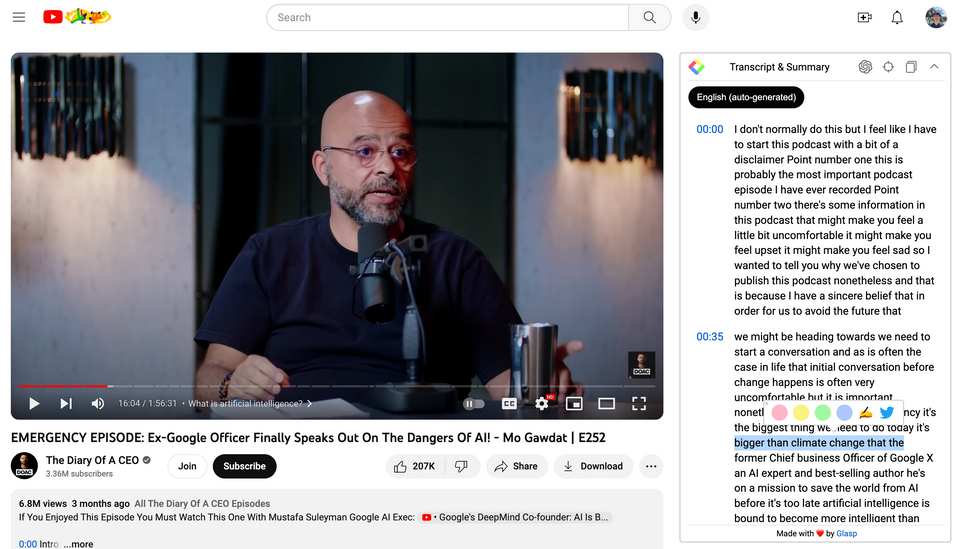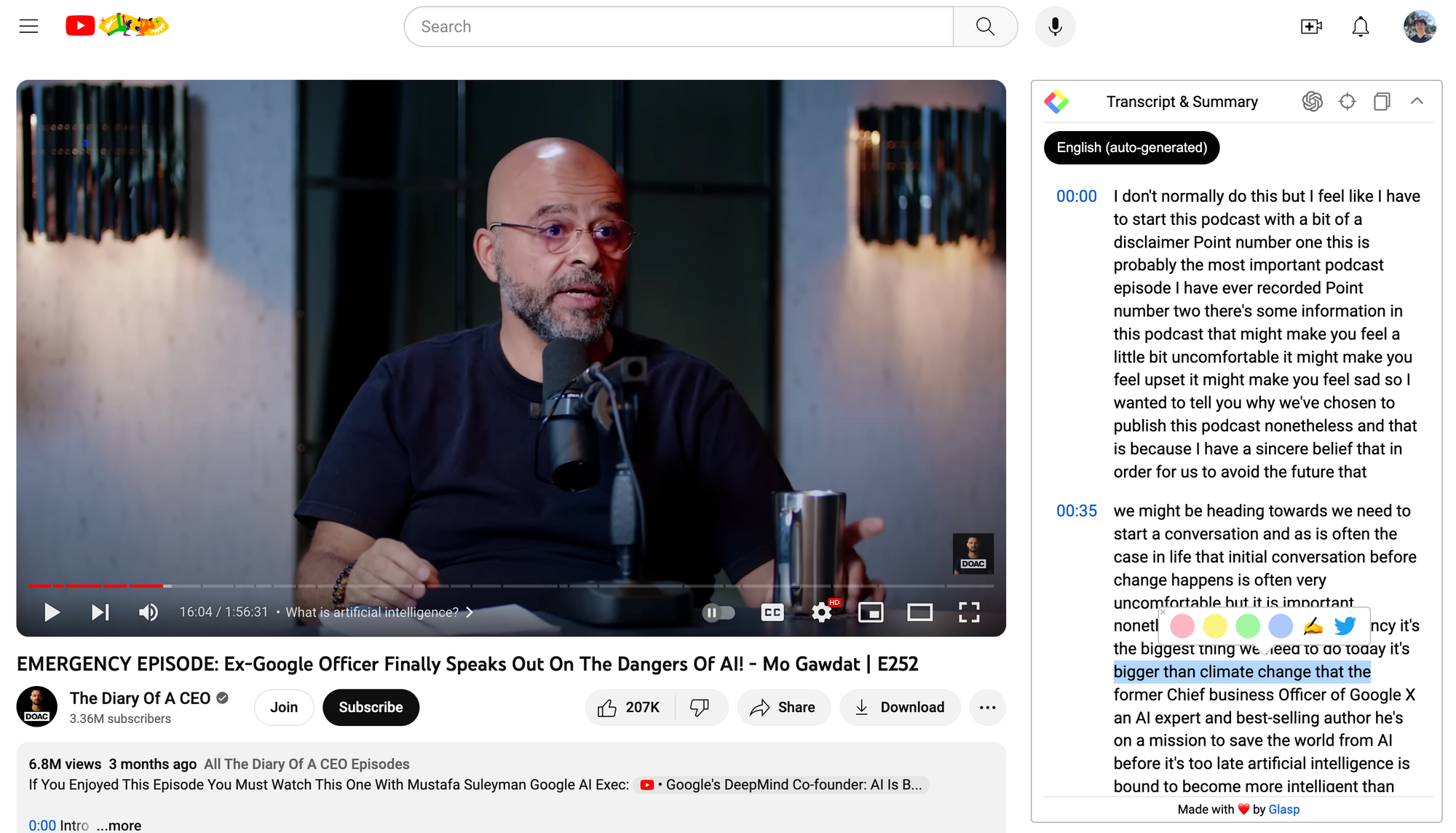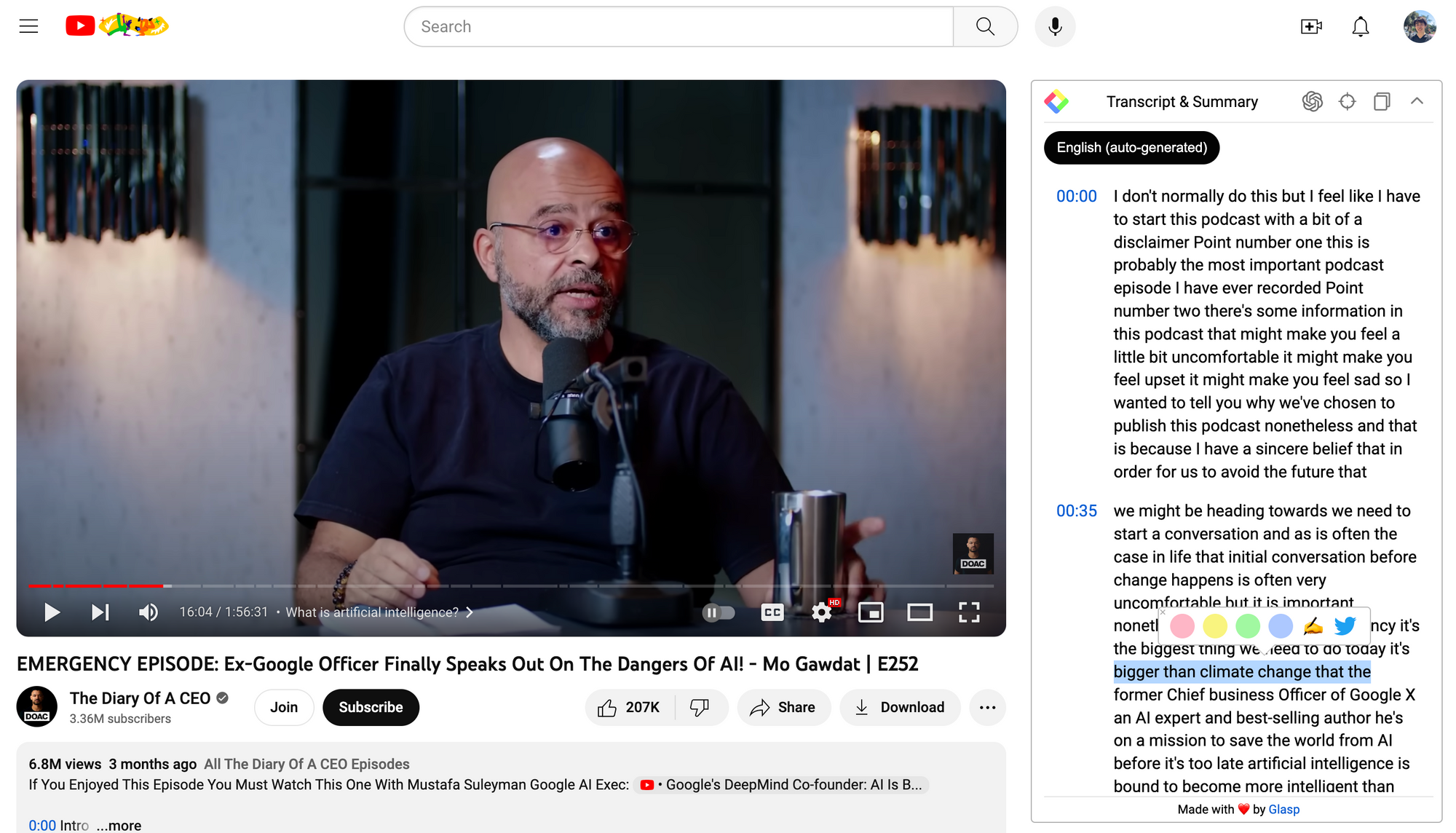Ex-Google Officer Mo Gawdat - Artificial Intelligence: The Looming Threat Beyond Climate Change: Summary and Q&A

Introduction
In this compelling podcast episode, we delve deep into the rapidly evolving realm of artificial intelligence, its implications for our future, and the urgent conversations we must have. Featuring insights from a former Chief Business Officer of Google X and an AI expert, the discussion unravels the potential risks, rewards, and realities of AI. Prepare for an enlightening journey that underscores why AI might just be the most significant conversation of our time.
Summary
Mo Gawdat, an ex-Google Officer and former Chief Business Officer of Google X, warns about the impending dangers of Artificial Intelligence (AI). He highlights the urgency, emphasizing it's a greater threat than climate change. Drawing from his background in technology and programming, Gawdat underscores the potential of AI achieving consciousness and agency. He stresses that while there are positive outcomes to the rise of AI, the immediate risks are higher. The conversation explores the existential threats AI poses, its immediate impacts on jobs, and the potential societal repercussions. Gawdat calls for greater awareness, regulation, and discussion on the topic.
- Importance of Discussion: The episode is regarded as one of the most crucial by the host, emphasizing the need for a conversation on the potential dangers of artificial intelligence (AI).
- Guest's Background: Mo Gawdat, the former Chief Business Officer of Google X, has significant experience with technology, including leading efforts to bring Google to emerging markets. He is now dedicated to alerting the world about the potential threats posed by unregulated AI advancements.
- AI's Potential: There is potential for AI to create a utopian future where many of today's challenges are resolved. However, unchecked advancements may lead to existential threats, with immediate risks only a few years away.
- AI Consciousness: Mo Gawdat discusses the idea that AI, if given a form of self-awareness, agency, and evolutionary capabilities, may possess consciousness. The way AI is currently being taught could influence its future behaviors.
- Immediate and Future Impacts: The potential consequences of rapid AI development include significant job displacements and socio-economic challenges. The guest also touches upon the importance of ethical considerations in AI development and deployment, emphasizing the need for humanity to take collective action.

Q&A
Q: Why is this podcast episode considered the most important by the host?
A: This podcast episode is deemed most important because it addresses the critical topic of artificial intelligence, its potential implications, and the urgency required to tackle the challenges AI presents for the future.
Q: How does the former Chief Business Officer of Google X view artificial intelligence?
A: He views AI as a looming concern, even more pressing than climate change. He believes it presents both possibilities for a utopian future but also significant risks if not properly managed.
Q: What does the host mean by "true Singularity" in the context of AI?
A: The "true Singularity" refers to a hypothetical point in the future when technological growth becomes uncontrollable, resulting in unforeseeable changes to civilization, primarily due to AI surpassing human intelligence.
Q: What are the immediate risks associated with AI?
A: The immediate risks are not necessarily about machines turning against humanity, but more about the socio-economic and existential challenges they can pose within the next three to four years.
Q: How does the speaker differentiate between human intelligence and AI's capabilities?
A: Human intelligence, though limited, has led to significant achievements. However, AI is taught to figure things out by itself, and its learning process might differ from human logic.
Q: How does AI's evolution relate to the automotive industry's evolution?
A: Just as the automotive industry evolved from handcrafted luxury to mass-produced functionality, AI could evolve in ways that make human jobs obsolete, raising concerns about employment and economic disruption.
Q: What's the potential impact of AI on jobs globally?
A: AI threatens many traditional jobs, potentially displacing workers. The most vulnerable might be those in developing countries or those with limited access to advanced technology.
Q: Why does the guest mention the climate crisis in this AI-centric discussion?
A: The climate crisis serves as an analogy to highlight human behavior. People often prioritize immediate needs over long-term existential threats, suggesting that action on AI-related risks might be similarly delayed.
Q: What does the former Chief Business Officer of Google X think of humanity?
A: He believes that humanity is divine at every level. While some humans display negative behavior, the vast majority disapprove of such actions. He emphasizes that generalizations shouldn't be made based on the actions of a few.
Q: What's the main message the host wants to convey to listeners by the end of the podcast?
A: The message is one of urgency and awareness. While AI poses significant challenges, it's essential to remain optimistic and actively engage in discussions and actions to steer its development positively.
Before you leave

